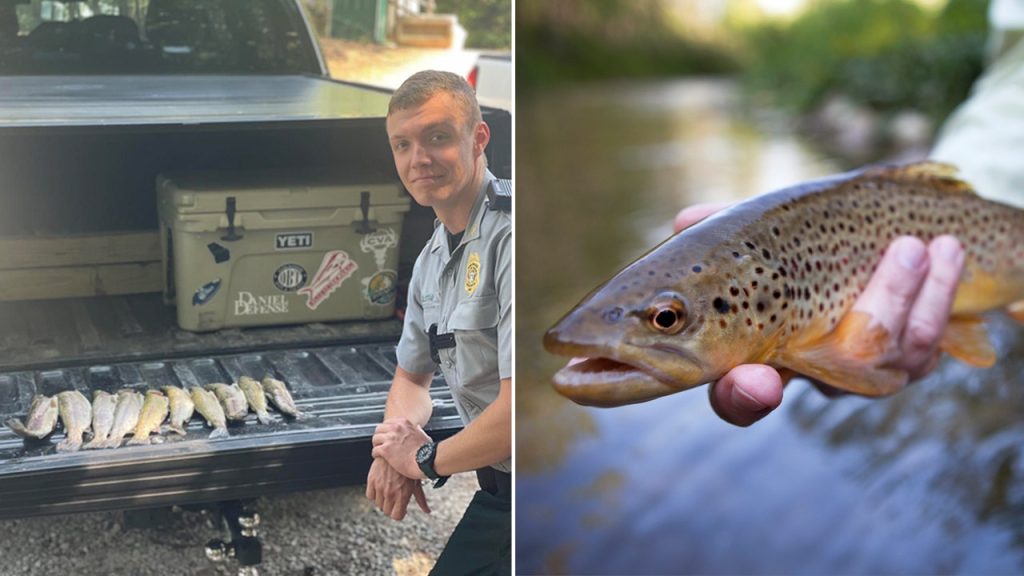A Georgia fisherman is facing consequences after being caught harboring an illegal number of freshwater fish by Game Warden Will Gilstrap of the Georgia Department of Natural Resources (DNR) Law Enforcement Division. The incident took place along the Chattachoochee River where Gilstrap observed the fisherman hiding fish along the river bank as he was catching them. Upon inspection, Gilstrap found the fisherman to be in possession of 10 trout, which exceeds the creel limit of 8 fish on seasonal trout streams. The trout were confiscated by Gilstrap and the Georgia DNR Law Enforcement Division, but it is unclear what fines or penalties the man may face as a result.
The news of the fisherman’s illegal activity was shared on the Georgia DNR Law Enforcement Division’s Facebook page, sparking mixed reactions from users online. Some users expressed sympathy for the fisherman, suggesting that he may have been fishing for food for himself or his family during difficult times. Others defended the actions of the game warden, acknowledging the need for limitations to protect the trout population and ensure fair opportunities for other anglers. The incident serves as a reminder of the importance of following regulations and limits in order to preserve natural resources and promote sustainability in the fishing industry.
Illegal fishing activities have been a concern for conservationists and wildlife officials, with poaching and overfishing threatening various fish populations worldwide. In New York, officers recently ticketed striped bass poachers after discovering illegal catches hidden in unusual places. Such incidents highlight the ongoing efforts to enforce regulations and protect fish species from exploitation. The work of game wardens like Gilstrap is crucial in monitoring and enforcing fishing laws to safeguard aquatic ecosystems and maintain a balance between recreational fishing and conservation efforts.
The enforcement of fishing regulations and penalties for violations play a vital role in promoting responsible fishing practices and sustainable management of freshwater fish stocks. By monitoring creel limits, size restrictions, and other rules, wildlife officials aim to prevent overexploitation of fish populations and ensure the long-term viability of fisheries for future generations. Education and awareness campaigns are also essential in raising public awareness about the importance of following fishing rules and regulations to protect aquatic biodiversity and maintain healthy ecosystems in rivers, lakes, and streams across the country.
While some may view fishing regulations as overly restrictive, they are essential for preserving fish populations and habitats in the face of growing environmental challenges. Limiting the number and size of fish that can be caught helps prevent depletion of stocks and allows populations to replenish and thrive. By holding individuals accountable for exceeding limits and engaging in illegal fishing activities, authorities send a strong message about the importance of respect for wildlife laws and the consequences of disregarding conservation measures. Ultimately, maintaining a balance between recreational fishing opportunities and conservation goals is crucial for ensuring sustainable and ethical practices in freshwater fishing.
In conclusion, the case of the Georgia fisherman caught with an illegal number of trout serves as a reminder of the need for responsible fishing practices and adherence to regulations to protect freshwater fish species and their habitats. The actions of game wardens like Will Gilstrap play a critical role in enforcing fishing laws and deterring illegal activities that threaten aquatic ecosystems. Through public awareness, education, and enforcement efforts, wildlife officials aim to promote sustainable fishing practices and preserve the natural resources that support diverse fish populations. By respecting creel limits, size restrictions, and conservation measures, anglers can contribute to the long-term health and viability of fisheries while enjoying recreational opportunities in Georgia’s rivers and lakes.


